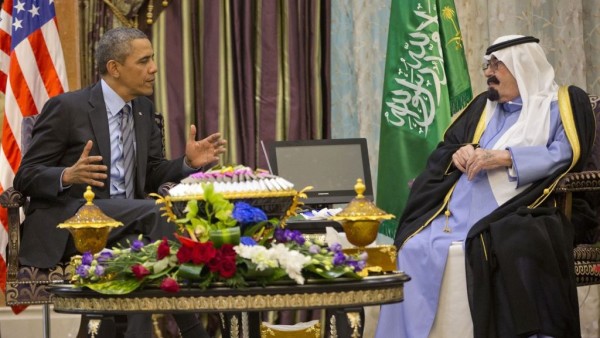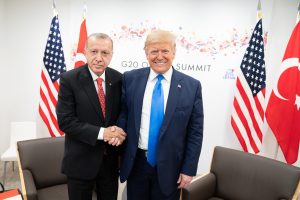by Robert E. Hunter
Viewed from the aerie of the Oval Office, US policy in the Middle East is much more pluses than minuses, and there is much to commend that view. President Barack Obama has successfully navigated the Ship of State past the Scylla and Charybdis of Iraq and Afghanistan. He has completed US troop withdrawals from the former and managed a process of buildup and then builddown in the latter, to the point that the American people have largely moved beyond the Afghanistan war — even though the same can’t be said for Afghanis or US war veterans and their families.
Obama has also kept at bay the baying from many quarters, domestic and foreign (the latter primarily Saudi Arabia and Israel) for a military attack on Iran. He was lucky in last year’s Iranian elections, which brought to the presidency someone who, to borrow a phrase from Margaret Thatcher about Mikhail Gorbachev, is “a man we can do business with.” That judgment depends on the will of Iran’s Supreme Leader, Ayatollah Ali Khamenei, but so far he has been complaisant.
Despite the best efforts of the enemies of a workable agreement with Iran on its nuclear program, the talks with the so-called P5+1 (the U.S., Britain, France, China, and Russia plus Germany) appear to have a better than even chance to succeed in keeping Iran from getting the bomb. One thing does seem clear: Obama is determined not to go to war with Iran, unless the Islamic Republic initiates hostilities; and at least so long as there are decent prospects for diplomacy, he will flash a bright red light to Israel to refrain from its own military strikes.
Thus has Obama managed to repair much of the regional damage and difficulty to US interests that he inherited. He has prevailed despite a cacophony of domestic opposition, including from people who should know better about the best interests of the United States. That is a pretty good record.
But there are also “known unknowns,” to quote former Defense Secretary Donald Rumsfeld, in areas that are serious but — let us hope — less consequential. The US continues to use drones to counter both Al Qaeda and affiliates and the Taliban, especially in Pakistan. Despite outcries against this policy, which has led to civilian deaths, Obama has obviously judged that these risks and moral costs beat putting American “boots on the ground” or doing nothing while terrorists regroup.
Syria continues to fester, with major human suffering. But it is hard to see what the US can do without potentially making matters worse in the region (more on this below). It is also hard to say much positive about the talks between Israel and the Palestinians, on which Secretary of State John Kerry has invested so much time and effort.
It may be that mutual accusations and “unilateral acts” by Israel and the Palestine Authority are simply the inevitable part of Arab-Israeli negotiations before deals are struck. Or perhaps the talks will just break down (unlikely) or be stretched out, once again, into never-never land. But is that so bad — measured not by what would help the US in the region, but by what disasters might really ensue if serious results are not reached soon? We have been through this litany time and again.
Further, the Egyptian government is brutally unpalatable in treating its opponents. But it is standing firm on the 1979 linchpin treaty with Israel and cooperating with it in countering terrorists/insurgents in the Sinai Peninsula. From the point of view of realpolitik (the dominant if unworthy optic in the Middle East for almost a century), the Egyptian generals’ bad behavior can be tolerated by Washington.
But while President Obama can grade his regional record as positive — or at least acceptable — in terms of “what really matters” to the US, it is still full of some “unknown unknowns.” The Syrian situation, for one, is bedeviled by the fact that the Obama administration has yet to reveal a plan for Syria in the event that President Bashar Al-Assad is indeed deposed. During his recent visit to Riyadh, Obama reportedly promised Saudi King Abdullah that the US will increase support for non-terrorist rebels. That suits the Saudi objective of toppling a Shi’a (Alawite) minority regime in Syria and replacing it by one dominated by Sunnis. But the US does not appear to have assessed how to forestall continuing humanitarian calamity in post-Assad Syria, plus a spreading regional civil war between Sunnis and Shi’as, with further gains for Islamist terrorists. (There was no public indication that Obama told Abdullah, in respectful but “no uncertain terms” that Saudi Arabia must finally squelch support for terrorism in Syria and elsewhere that emanates from elements in the Kingdom.)
Meanwhile, Secretary Kerry’s heavy investment in brokering an Israel-Palestine agreement by this April 29th raised expectations about US influence. Particularly daunting is that the US has been asking Israel to negotiate on Palestine while Jerusalem worries about a possible Iranian “existential threat.” The Obama administration asking Israel to take fundamental decisions about Palestine at the same time as trusting the US on Iran is almost surely Mission Impossible.
One striking thing is that Israeli Prime Minister Benjamin Netanyahu’s efforts to shape American domestic opinion on both the Iranian and Palestinian issues are being challenged in the United States more than ever before. A striking example was a manifesto issued this week by several prominent former US officials. It puts most responsibility — read “blame” — on Israel for putting roadblocks in the way of the (never-ending) “peace process.”
The bottom line is that President Obama has got some of the truly big regional issues moving in a direction amenable to basic US interests — Iraq, Afghanistan, counter-terrorism, even Iran. That is a good 5-plus years’ work. But there are undercurrents and lacunae. First, the Arab Spring still has a long way to go before — if ever — it yields lasting positive results for the average person in the Arab world. These undercurrents are also impacting negatively on Turkey’s domestic and regional future. Second, there is the Syria conundrum, without a viable US game-plan for the future. Third, there is not enough interconnecting strategic tissue that will help the US avoid further difficulties and potential strife in the region, possibly sooner rather than later — e.g., in Pakistan and post-withdrawal Afghanistan. Fourth, US planning for long-term regional security, along with the necessary enlisting of support by European allies, is still falling short. This includes preparing for the possibility, however remote that may now seem, of Iran’s positive reintegration into the region.
Regrettably, “strategic thinking” on the region in Washington is at a premium. The Obama administration needs to understand that, while hopping from one Middle East/North Africa/Southwest Asia crisis to the next can provide some successes, that’s no long-term solution for enduring US interests in the region or for America’s reputation for competence and sense of purpose. And such reputation, extrapolated around the world, is a major component of US national power and influence.
Photo: US President Barack Obama meets with Saudi King Abdullah at Rawdat Khuraim, Saudi Arabia, Friday, March 28, 2014. Credit: AP/Pablo Martinez Monsivais






If “O” really wanted to change the picture, he’d stop listening to all the old “Cold War Warriors”, fire them, outlaw, if by executive orders, the various “foreign interest first” lobby groups, get the Military out of all the various countries like Africa, as well as all he overseas outposts/bases, bring the troops home, and the list goes on. His foreign policy is spread so thin, with the old hardliners running most of the shows, but we all know this isn’t going to happen. The power elite have grown too strong, the congress too weak, everyone who could make a difference, instead have been bit by the “crappy government bug”, beholden to which ever host has the most for the individual pac account. I wonder what all the stooges are going to do when the bottom falls out and the country ends up being just like Gaza, an open air cesspool?